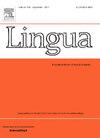Interpreter mediation as other-initiated self-repair in court: Effects on the defence in Chinese bilingual criminal trials
IF 1.3
3区 文学
0 LANGUAGE & LINGUISTICS
引用次数: 0
Abstract
This study examines the linguistic phenomenon of other-initiated self-repairs (OISRs) in the specific context of Chinese inquisitorial criminal courts. These OISRs are prompted by interpreters and implemented by non-native English-speaking African defendants, adversely affecting the defendants’ defence strategies. Transcriptions of five interpreter-mediated trials are analysed to understand the dynamics at play in court settings. Quantitative analysis of turn distribution data and subsequent qualitative conversation analysis reveal that linguistically vulnerable defendants are relegated to a constrained discursive space with limited support from their lawyers in Chinese bilingual courts. In these settings, frequent interpreter-initiated repairs hinder defendants disproportionately, undermining their ability to establish credibility, present new evidence, argue for exoneration or use sympathy cues for leniency. Placing these findings in the context of Chinese court power dynamics, we argue that the pervasive interpreter-initiated OISRs in Chinese courtrooms should be considered a shared responsibility rooted in the court’s language ideology and its legal beliefs and culture, which, at present, systemically marginalise defendants’ right to a fair trial.
翻译调解作为法庭上他人发起的自我修复:对中国双语刑事审判辩护的影响
本研究考察了中国刑事讯问法院特定语境下的“他人发起的自我修复”语言现象。这些OISRs由口译员提示并由非母语为英语的非洲被告执行,对被告的辩护策略产生不利影响。五个口译员介导的审判转录分析,以了解在法庭设置发挥的动力。对回合分布数据的定量分析和随后的定性对话分析表明,在中国双语法庭中,语言弱势的被告被限制在一个有限的话语空间中,律师的支持有限。在这些情况下,频繁的由口译员发起的修复对被告造成了不成比例的阻碍,削弱了他们建立可信度、提出新证据、争取免罪或利用同情暗示宽大处理的能力。将这些发现置于中国法院权力动态的背景下,我们认为,在中国法庭上普遍存在的由口译员发起的oisr应被视为一种植根于法院语言意识形态及其法律信仰和文化的共同责任,这些意识形态和文化目前系统性地边缘化了被告获得公平审判的权利。
本文章由计算机程序翻译,如有差异,请以英文原文为准。
求助全文
约1分钟内获得全文
求助全文
来源期刊

Lingua
Multiple-
CiteScore
2.50
自引率
9.10%
发文量
93
审稿时长
24 weeks
期刊介绍:
Lingua publishes papers of any length, if justified, as well as review articles surveying developments in the various fields of linguistics, and occasional discussions. A considerable number of pages in each issue are devoted to critical book reviews. Lingua also publishes Lingua Franca articles consisting of provocative exchanges expressing strong opinions on central topics in linguistics; The Decade In articles which are educational articles offering the nonspecialist linguist an overview of a given area of study; and Taking up the Gauntlet special issues composed of a set number of papers examining one set of data and exploring whose theory offers the most insight with a minimal set of assumptions and a maximum of arguments.
 求助内容:
求助内容: 应助结果提醒方式:
应助结果提醒方式:


